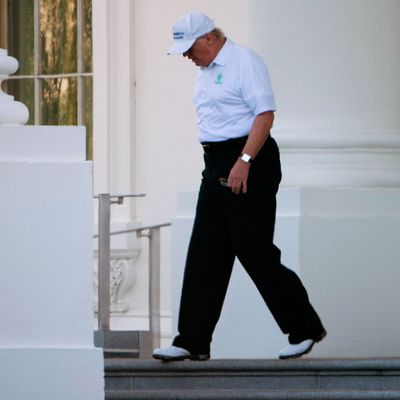
Even as congressional Republicans high-five each other for enacting a tax bill that could come back to haunt them in next year’s midterms, they are publicly and privately discussing some of the lessons they learned during the messy and perilous process of getting the bill across the line. One very clear lesson, according to a report from The Wall Street Journal, is that it really helped to keep the president of the United States from getting very involved in the wheeling and the dealing. Here’s how Paul Ryan put it:
“He was very good on this,“ said House Speaker Paul Ryan (R., Wis.) ”He just realized being more disciplined and letting the tax writers get this deal done was the best way to go.”
Trump was not totally inactive. His early insistence on a very big corporate income tax cut took a huge chunk of revenue off the table, and ultimately contributed to both the unpopularity of the bill and to its strange structure (with individual tax cuts being phased out) and budget-busting implications. But he wasn’t much involved in the details. And on the one big task he assigned himself, he struck out:
The White House had tried to pick off a few Democratic votes, but the effort went nowhere. On Sept. 27, Mr. Trump flew to Indiana, with the state’s Democratic senator, Joe Donnelly, in tow. They talked about what the tax plan might include. “I had no problem with the outreach,” Mr. Donnelly said. Chuckling, he added: “It’s just that they ignored everything we said.”
In the end, Trump was a bit of a bystander when the deal went down, to the point that congressional Republicans sometimes forgot to cut him in on the credit:
Early Wednesday, after a Senate vote—interrupted by protesters in the gallery—that put the bill on the verge of passing, Republicans piled into a 1 a.m. press conference to congratulate themselves on their hard work, praise the bill and list its benefits for the American people.
They outlined how they will sell the measure in the 2018 campaigns.
Ten senators spoke for a total of nine minutes. Two words that weren’t used: “President” and “Trump.”
There was one issue the president was focused on beyond corporate tax rates, as Lindsey Graham reports:
As a former real-estate magnate, Mr. Trump had a good grasp of taxes; Mr. Graham recalled the president discussing how they influence golf-course development during one of their games.
Generally, though, Trump did not repeat his often disastrous interference in the effort to repeal and replace Obamacare. As Michael Warren notes, even his “salesmanship” for the tax bill was from a great distance:
Trump’s role was to cheerlead by encouraging party unity. His forays into the debate were mostly counterproductive. The tax cut effort was better off when he simply assured the country “there will be no veto” to whatever Congress sent him.
So even though this bill will inevitably go down in history as the “Trump tax cut,” his fingerprints on it are vanishingly light. Before it passed its last major hurdles, Warren summed it all up:
Donald Trump appears to have his first major legislative victory in sight. How did he do it? Mostly by staying out of the way.
Maybe it’s a trend.






























